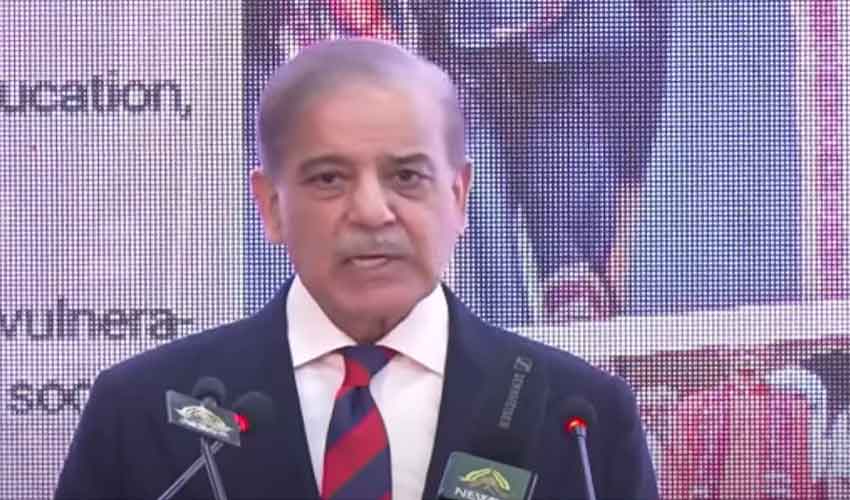PM stresses need for 'sacrifice, blood, sweat' for economic growth
Shehbaz launches 'Uraan Pakistan' national economic transformation plan for 2024-29

Stay Connected, Stay Informed - Follow us on Whatsapp for Real-time Updates!
Prime Minister Shehbaz Sharif inaugurated the 'Uraan Pakistan' program, a national economic transformation plan for 2024-29, at a ceremony in Islamabad. The event also featured the unveiling of the program’s logo and accompanying book.
The ceremony was attended by Punjab Chief Minister Maryam Nawaz, Khyber Pakhtunkhwa Governor Faisal Karim Kundi, Finance Minister Muhammad Aurangzeb, Planning Minister Ahsan Iqbal, and Deputy Prime Minister Ishaq Dar.
Addressing the gathering, PM Shehbaz Sharif highlighted the challenges faced over the past nine months, emphasizing the relentless efforts of the federal and provincial governments and "partners in prosperity and progress to achieve macroeconomic stability".
“But this is just the beginning of a long journey which would entail sacrifice, blood and sweat to achieve economic growth and finding our lost place among nations,” he said, adding that the government had to negotiate with the International Monetary Fund (IMF) to stabilise the economy despite internal and external obstacles.
Prime Minister Shehbaz Sharif said that Nawaz Sharif and his allies decided to sacrifice their politics for national interest, and decided to go to any extent to save the state.
The prime minister accused certain individuals of attempting to sabotage the IMF agreement by writing letters against it. “Such actions were a grave injustice, but we persevered, and the program was approved,” he remarked.
He questioned why the country needed another IMF bailout, citing state-owned firm losses, the circular deficit, and corruption. He explained how the economy's growth will be achieved by making inputs cheaper, encouraging investment, and removing import barriers to stimulate competitiveness, efficiency, and export-led growth.
“Export-led growth is the ultimate saviour of Pakistan. You need to earn dollars that is only possible through exports,” he added, adding that this was also the key pillar of the current reform program.
Five-Year Economic Framework
The “Uraan Pakistan” plan revolves around the "Five Es" -- exports, e-Pakistan, equity and empowerment, environment (including food and water security), and energy and infrastructure. PM Shehbaz explained that the framework aims to address critical economic issues and restore Pakistan’s global standing.
The premier underscored the importance of export-led growth as the foundation of the plan, emphasizing the need to boost dollar earnings through competitive exports. He also advocated for expanding the digital economy, adopting artificial intelligence, and creating political harmony to promote privatisation to address inefficiencies in state-owned enterprises.
PM Shehbaz acknowledged setbacks, such as the delayed privatisation of Pakistan International Airlines (PIA), but reaffirmed the government's commitment to attracting $10 billion in annual investments. He stressed that fostering local investment was essential to encouraging foreign investment.
“We faced a setback in PIA’s privatisation. Facts should be accepted. There is no doubt our team made full efforts and we are doing so again,” he said.
Collaborative Efforts and Political Harmony
Deputy Prime Minister Ishaq Dar called for political unity to achieve sustainable progress, urging an end to "petty politics." He highlighted the decline in Pakistan’s global economic ranking, from 24th to 47th, and emphasized the importance of implementing the charter of the economy. “Pakistan can still join the G-20 club with consistent efforts,” Dar stated.
Finance Minister Muhammad Aurangzeb detailed the key pillars of the economic plan, including stimulating private investment to create jobs, boosting exports for productivity growth, and optimizing public finances for long-term stability.
He outlined specific goals, such as achieving 6% GDP growth by 2028, generating one million jobs annually, securing $10 billion in private investment each year, and reaching $60 billion in exports by the same year. The finance minister also announced the establishment of a separate tax policy unit to ensure policy continuity and reduce tax leakages through data analytics.
Aurangzeb stressed that the plan's success lies in its implementation, not just its design. “We know the what and the why; now we must act,” he concluded.



.jpeg)





.jpeg)